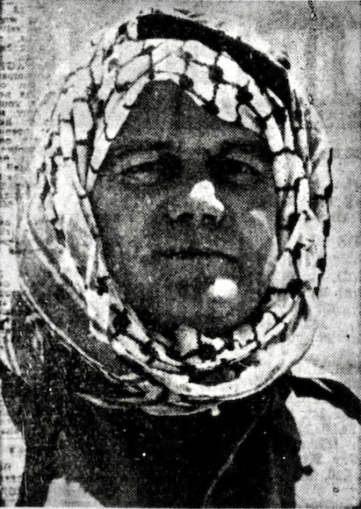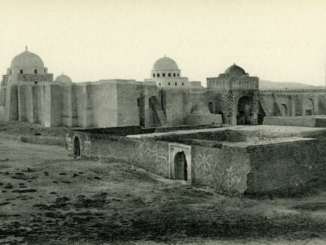In 1961 my uncle, John Alldridge spent some time on the set of Lawrence of Arabia and reported his experiences for the Birmingham Mail – Jerry F

Newspaper article header, Birmingham Mail,
Unknown photographer – © 2022 Newspapers.com, reproduced with permission
The best paid maniacs in the world
The best time of day in the desert comes an hour before dusk. The brassy furnace heat has gone, and with it the shimmering heat haze which has hung like a curtain of fine gauze between you and the distant skyline all day.
Each evening at this time across the desert appear a dozen whirlwinds that converge on the camp at tremendous speed. In each dust cloud is a battered jeep carrying half a dozen red-faced, dust-smeared men.
They call themselves “Lean’s Mobile Maniacs”: a dedicated shock-troop of specialists, each man picked and the best in the business. True, they are probably also the best-paid maniacs in the world. But out here, in the heat and the discomfort and the sheer boredom of the desert, working stripped to the waist in heat that scorches your eyebrows, they earn every penny of it.
Long after the last cursing, desert-happy “sparks” (electrician) and “chippy” (carpenter) have settled down to their beer, a solitary Jeep comes roiling more sedately out of the dusty sunset.
It contains a slim, tanned, darkly handsome man in his late forties, always immaculately dressed. This is David Lean, director of “Lawrence of Arabia” and commander-in-chief of this strange little desert army.
Sam Spiegel, the film’s producer, is a typical product of Holywood; colourful, ebullient, resourceful, brash, yet vastly shrewd.
This incongruous couple first came together to make “The Bridge on the River Kwai.”
Lean expects to take a year at least shooting “Lawrence” ( the film has already been a year in preparation).
For 25 years other producers have tried to film the story of Lawrence and failed.
Usually the stumbling block has been the rights to Lawrence’s book, “The Seven Pillars of Wisdom,” held by the Lawrence family.
Then, in February last year, Professor Arnold Lawrence, youngest brother and literary executor of T. E. Lawrence, sold the film rights to Spiegel’s Horizon Films, satisfied that the team which had made “The Bridge on the River Kwai” would do right by his brother. Lean’s version of the Lawrence enigma will follow his own line.
To this day no two people who knew Lawrence — and I have met many since I came out here — can completely agree as to his worth.
Who was this man who welded together the warring tribes of the Arabian desert into a guerilla army that broke the back of the Ottoman Empire between 1916 and 1918; then, hailed as the “Uncrowned King of the Desert,” sought obscurity and forgetful-ness as an aircraftman in the R.A.F., who called himself “Ross”?
Lean’s answer to the riddle is typical of the man and of the filmmaker.
“I see the Lawrence story on two levels,” he says. “One is a simple, straightforward schoolboy adventure story. The other is the story of a man hagridden by his destiny. No matter how he struggles to avoid it, the hand of fate is always on his shoulder, I hope you will be able to find traces of both in the film.”
From the beginning, producer Spiegel had in mind the actor he considered the ideal film “Lawrence” – Marlon Brando, a star of international box-office standing and a versatile actor.
Brando was enthusiastic. He would be available, he said, if Spiegel would wait until he had concluded his prior commitments. But Mr. Spiegel could not wait.
From a series of tests of promising young actors, Lean chose Peter O’Toole, a 27-year-old Yorkshireman, who had made a name for himself at Stratford-upon-Avon but had only appeared in two minor films.
Facially O’Toole is remarkably like Lawrence (by an odd coincidence he is also exactly the same age as Lawrence at the time). One important discrepancy is in their height. O’Toole is a much bigger man than Lawrence with whom his smallness and feeble physique were obsessions.
Spiegel and Lean now have the tricky problem of persuading star actors to play what are, after all, supporting parts.
I know they would like Jack Hawkins to play General Edmund Allenby, Lawrence’s commander-in-chief during the desert campaign.
They would also like Alec Guinness for Prince Feisal; and Kirk Douglas for Auda Abu Tayi, the brigand chief whom Lawrence called “the greatest fighting man in North Arabia”; and perhaps Gene Kelly as Gallacher (originally it was to have been Lowell Thomas), a brash young American war correspondent sent to the Middle East to find a modern Richard Coeur de Lion.
Will they get them? Lean smiles shyly and counters with: “Well, they’re all good parts. And actors like good parts.”
Reproduced with permission
© 2024 Newspapers.com
Jerry F 2024



